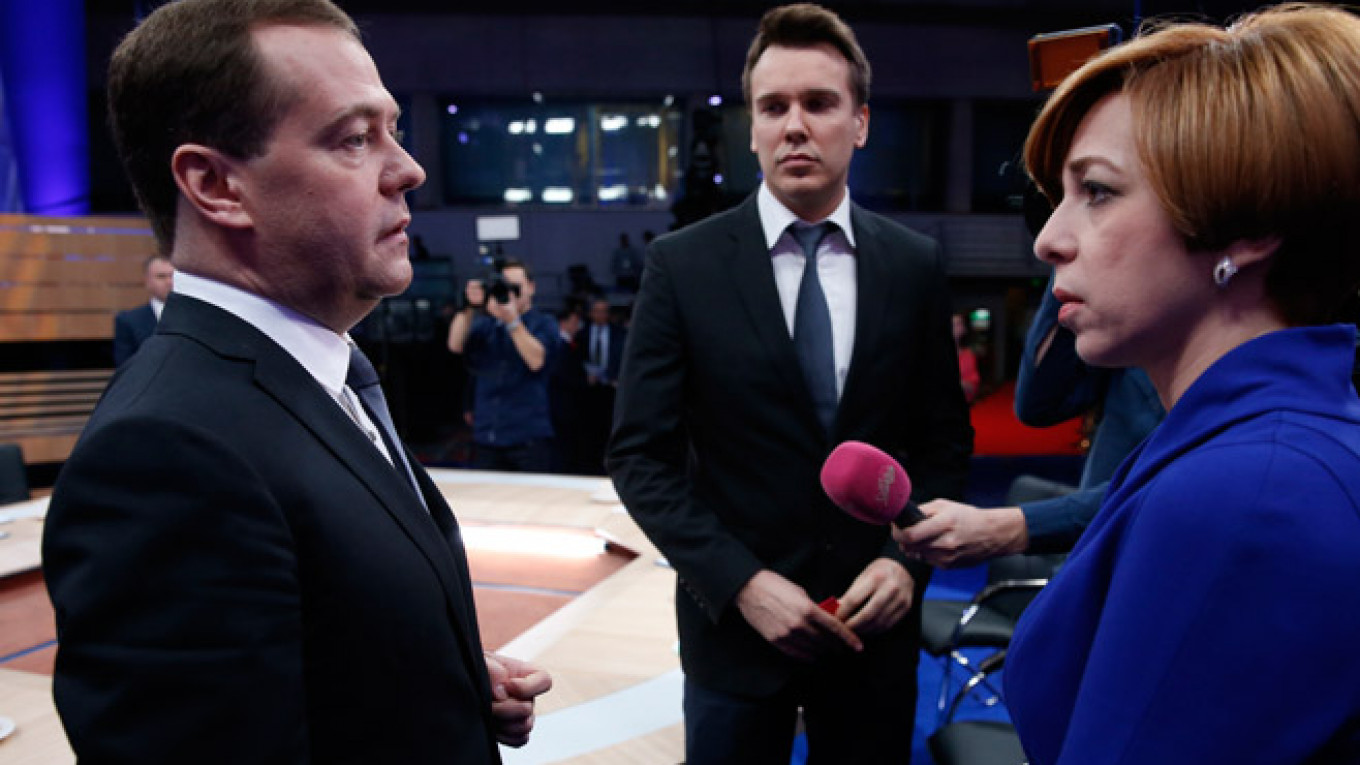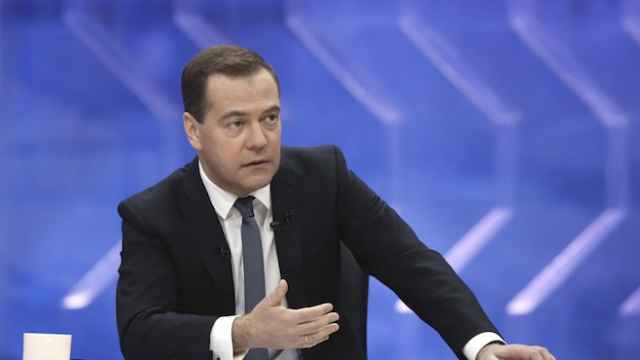Prime Minister Dmitry Medvedev struck an optimistic note throughout a 1 1/2-hour news conference Wednesday, drawing attention to what he viewed as Russia's crowning achievements of this year: the Sochi Olympic victory and the annexation of Crimea.
Medvedev spoke about a wide array of issues, from the economy to Russia's role in the international community, and the Ukraine crisis.
On the economy, Medvedev praised his Cabinet's efforts to maintain GDP growth of 0.7 percent this year. He said the ruble is currently undervalued, but emphasized his view that international sanctions against Russia "affect both Russia and those who imposed them against us."
Still, the crisis could inspire progress: "Sanctions give us the impetus to work on import substitution and on the creation of competitive industries," he said.
Russia's Economic Development Ministry has predicted that Russia's economy is likely to contract by 0.8 percent next year.
Russia's victory at the Winter Olympics in Sochi and its annexation of Crimea outshone the country's economic woes in 2014, Medvedev said.
According to Medvedev, Russia has lost "tens of billions of dollars" due to Western sanctions, but the European Union's economy lost 40 billion euros ($49.5 billion) this year and is set to lose an additional 50 billion euros in 2015.
To spur import substitution the government will subsidize interest rates for manufacturers that have risen dramatically due to ruble devaluation and sanctions that limited access to foreign capital, according to the prime minister.
Neither Russia nor the world at large ever fully recovered from the 2008-09 financial crisis, Medvedev said. Though 2011 and 2012 were years of relative prosperity, numerous structural issues were never resolved after the crisis ended, he said.
At present, Russia is particularly susceptible to the consequences of the sinking price of oil, which has dropped by about 40 percent since the start of this year.
Faced with criticism about the government's failure to diversify the economy, Medvedev said that Russia first grew dependent on oil "in the 1960s and 1970s," and that it will take "decades" to change the status quo. At the same time, the government is brimming with reform proposals and ideas on easing the situation for Russia's business community, he said.
With regard to whether or not Crimea played a role in shaping the current economic crisis in Russia, Medvedev said that it would be impossible to speak about Crimea in "economic terms."
When asked about how much the Crimea annexation might be expected to cost in terms of Russia's economic slowdown, which sanctions have been widely blamed for, Medvedev stressed: "Crimea is our history and our modern destiny. Our goal today is to integrate it into Russia's economic and legal framework."
Addressing the Ukraine crisis in general, Medvedev said that in the past two decades Russia has contributed more than $80 billion to the Ukrainian economy via gas discounts, but that Ukraine has not responded to Russia "in a civilized manner."
When asked whether Moscow is now irreversibly entrenched in crisis with the West, Medvedev emphasized the country's inextricable historic nexus with Europe. "Russia is part of Europe and part of the European civilization. It is a separate country with its own traditions, history and culture, [but] we are part of Europe," he said.
In addition, Medvedev, who, unlike President Vladimir Putin, has reportedly developed a good rapport with U.S. President Barack Obama, said "the current American administration does not behave in an adequate and predictable way."
Medvedev concluded by saying that the Sochi Olympics and Crimea annexation were for him the most memorable events of the past year.
The annual conference brought Medvedev together with journalists from the country's five leading TV stations. In addition to state-run Channel One, Rossia One and NTV, reporters from independent channels Ren-TV and Dozhd were present in the studio.
Contact the author at i.nechepurenko@imedia.ru
A Message from The Moscow Times:
Dear readers,
We are facing unprecedented challenges. Russia's Prosecutor General's Office has designated The Moscow Times as an "undesirable" organization, criminalizing our work and putting our staff at risk of prosecution. This follows our earlier unjust labeling as a "foreign agent."
These actions are direct attempts to silence independent journalism in Russia. The authorities claim our work "discredits the decisions of the Russian leadership." We see things differently: we strive to provide accurate, unbiased reporting on Russia.
We, the journalists of The Moscow Times, refuse to be silenced. But to continue our work, we need your help.
Your support, no matter how small, makes a world of difference. If you can, please support us monthly starting from just $2. It's quick to set up, and every contribution makes a significant impact.
By supporting The Moscow Times, you're defending open, independent journalism in the face of repression. Thank you for standing with us.
Remind me later.






